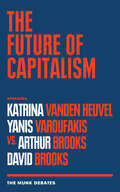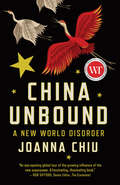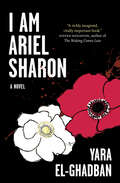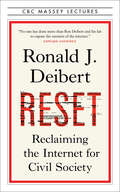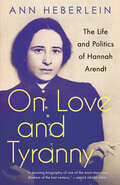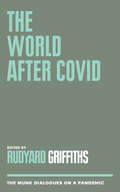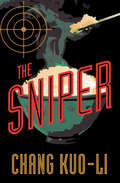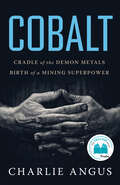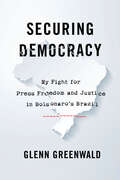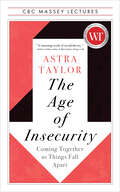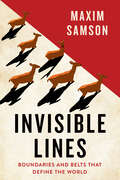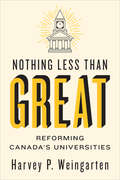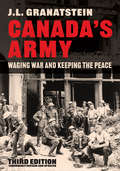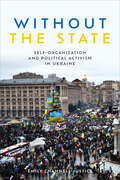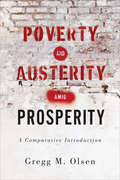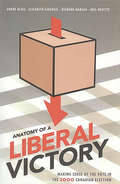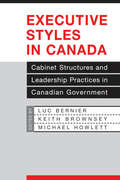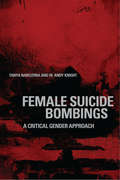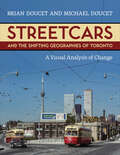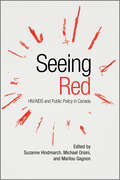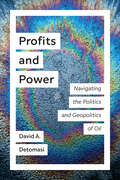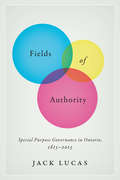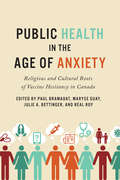- Table View
- List View
The Future of Capitalism: The Munk Debates (The Munk Debates)
by Katrina Vanden Heuvel Yanis Varoufakis Arthur Brooks David BrooksThe twenty-fifth semi-annual Munk Debate, held on December 4, 2019, pits editorial director and publisher of the Nation Katrina vanden Heuvel and former finance minister of Greece Yanis Varoufakis against Harvard professor Arthur Brooks and New York Times columnist David Brooks to debate whether the capitalist system is broken.“We need to organise politically to defend the weak, empower the many, and prepare the ground for reversing the absurdities of capitalism.” — Yanis VaroufakisIn Western societies, the capitalist system is facing a level of distrust not seen in decades. Economic inequality is rampant. Life expectancy is falling. The environment is being destroyed for profit. Political power is wielded by wealthy elites and big business. For capitalism’s critics, it is clear that the system is not designed to help average people. Their solution is a top-to-bottom reform of the “free market” along more socialist and democratic lines. For proponents of capitalism, however, this system has been the greatest engine of economic and social progress in history. Not only has capitalism made all of us materially better off, its ideals are responsible for everything from women’s rights to a cleaner environment to political freedoms. The answer to society’s current ills is more capitalism, more economic freedom, and more free markets.The twenty-fifth semi-annual Munk Debate, held on December 4, 2019, pits editorial director and publisher of the Nation Katrina vanden Heuvel and former finance minister of Greece Yanis Varoufakis against Harvard professor Arthur Brooks and New York Times columnist David Brooks to debate whether the capitalist system is broken.
China Unbound: A New World Disorder
by Joanna ChiuWhile the United States stumbles, an award-winning foreign correspondent chronicles China’s dramatic moves to become a dominant power. As the world’s second-largest economy, China is extending its influence across the globe with the complicity of democratic nations. Joanna Chiu has spent a decade tracking China’s propulsive rise, from the political aspects of the multi-billion-dollar “New Silk Road” global investment project to a growing sway on foreign countries and multilateral institutions through “United Front” efforts. Chiu offers readers background on the protests in Hong Kong, underground churches in Beijing, and exile Uyghur communities in Turkey, and exposes Beijing’s high-tech surveillance and aggressive measures that result in human rights violations against those who challenge its power. The new world disorder documented in China Unbound lays out the disturbing implications for global stability, prosperity, and civil rights everywhere.
I Am Ariel Sharon
by Yara El-GhadbanA bold and innovative novel, I Am Ariel Sharon dives into the tortured mind of the controversial Israeli prime minister as he lies comatose and faces an ultimate reckoning.Award-winning Palestinian Canadian novelist Yara El-Ghadban imagines the confrontation at death’s door between Ariel Sharon, the “King of Israel,” and the women closest to him — his mother, his wives, and the mysterious nurse Rita. Like latter-day Greek furies, they lament the brutality of his life and maltreatment of the Palestinian people and demand he face up to his part in the bloodshed of Israel’s wars.Here is an extraordinary, magical, and impassioned story of nearly impossible empathy, the singular work of a novelist in full flight.
Reset: Reclaiming the Internet for Civil Society
by Ronald DeibertIn the 2020 CBC Massey Lectures, bestselling author and renowned technology and security expert Ronald J. Deibert exposes the disturbing influence and impact of the internet on politics, the economy, the environment, and humanity. Digital technologies have given rise to a new machine-based civilization that is increasingly linked to a growing number of social and political maladies. Accountability is weak and insecurity is endemic, creating disturbing opportunities for exploitation. Drawing from the cutting-edge research of the Citizen Lab, the world-renowned digital security research group which he founded and directs, Ronald J. Deibert exposes the impacts of this communications ecosystem on civil society. He tracks a mostly unregulated surveillance industry, innovations in technologies of remote control, superpower policing practices, dark PR firms, and highly profitable hack-for-hire services feeding off rivers of poorly secured personal data. Deibert also unearths how dependence on social media and its expanding universe of consumer electronics creates immense pressure on the natural environment. In order to combat authoritarian practices, environmental degradation, and rampant electronic consumerism, he urges restraints on tech platforms and governments to reclaim the internet for civil society.
On Love and Tyranny: The Life and Politics of Hannah Arendt
by Dr. Ann HeberleinIn an utterly unique approach to biography, On Love and Tyranny traces the life and work of the iconic German Jewish intellectual Hannah Arendt, whose political philosophy and understandings of evil, totalitarianism, love, and exile prove essential amid the rise of the refugee crisis and authoritarian regimes around the world. What can we learn from the iconic political thinker Hannah Arendt? Well, the short answer may be: to love the world so much that we think change is possible.The life of Hannah Arendt spans a crucial chapter in the history of the Western world, a period that witnessed the rise of the Nazi regime and the crises of the Cold War, a time when our ideas about humanity and its value, its guilt and responsibility, were formulated. Arendt’s thinking is intimately entwined with her life and the concrete experiences she drew from her encounters with evil, but also from love, exile, statelessness, and longing. This strikingly original work moves from political themes that wholly consume us today, such as the ways in which democracies can so easily become totalitarian states; to the deeply personal, in intimate recollections of Arendt’s famous lovers and friends, including Heidegger, Benjamin, de Beauvoir, and Sartre; and to wider moral deconstructions of what it means to be human and what it means to be humane.On Love and Tyranny brings to life a Hannah Arendt for our days, a timeless intellectual whose investigations into the nature of evil and of love are eerily and urgently relevant half a century later.
The World After COVID: The Munk Dialogues on a Pandemic (The Munk Debates)
by Rudyard GriffithsFrom the world-renowned Munk Debates comes a collection of dialogues by leading intellectuals envisioning our post-pandemic future. During this time of social distancing, the acclaimed Munk Debates series have been reimagined into a series of dialogues by leading intellectuals who examine the geopolitical, economic, technological, and historical angles of this unprecedented new era. How will the world look after COVID-19? What is the future for the international economy and institutions? Will the global balance of power shift? Can technology save us? These are the questions that have occupied the best minds since the beginning of the pandemic. In a series of one-on-one conversations with moderator Rudyard Griffiths, renowned author Malcolm Gladwell, journalist Fareed Zakaria, and New York Times columnist David Brooks, along with six other thinkers, dissect what brought us here and what comes next.
The Sniper
by Kuo-Li ChangJason Bourne meets John McClane in this electrifying thriller about a special-forces sniper and a seasoned homicide detective who get caught up in a criminal conspiracy that involves the highest levels of power. Twelve days before retirement, Taipei police detective Wu is handed a curious case: a naval officer has been found dead in his hotel room. While it is immediately apparent to Wu that the officer has been murdered, the military insist it was suicide and want the case closed with no questions asked. Soon, however, more high-ranking officers turn up dead, and Wu realizes he has a full-blown conspiracy on his hands. Meanwhile in Italy, Alex, a young Taiwanese sniper, ex-Marine, ex–French Foreign Legion, and currently a fried-rice chef in Manarola, is called back into service. Ordered by his handler to assassinate a high-level Taiwanese government advisor in Rome, he soon finds himself on the run, hunted across Europe by his old brothers-in-arms.
Cobalt: The Making of a Mining Superpower
by Charlie AngusThe world is desperate for cobalt. It drives the proliferation of digital and clean technologies. But this “demon metal” has a horrific present and a troubled history. The modern search for cobalt has brought investors back to a small town in Northern Canada, a place called Cobalt. Like the demon metal, this town has a dark and turbulent history. The tale of the early-twentieth-century mining rush at Cobalt has been told as a settler’s adventure, but Indigenous people had already been trading in metals from the region for two thousand years. And the events that happened here — the theft of Indigenous lands, the exploitation of a multicultural workforce, and the destruction of the natural environment — established a template for resource extraction that has been exported around the world. Charlie Angus reframes the complex and intersectional history of Cobalt within a broader international frame — from the conquistadores to the Western gold rush to the struggles in the Democratic Republic of Congo today. He demonstrates how Cobalt set Canada on its path to become the world’s dominant mining superpower.
Securing Democracy: My Fight for Press Freedom and Justice in Brazil
by Glenn GreenwaldIn this riveting follow-up to his acclaimed international bestseller No Place to Hide, Glenn Greenwald documents the courageous fight for press freedom in Brazil, where authoritarianism and rampant corruption threaten the most fundamental principles of democracy.In 2019, award-winning journalist Glenn Greenwald writes in his gripping new book, “a series of events commenced that once again placed me at the heart of a sustained and explosive journalistic controversy.” New reporting by Greenwald and a team of Brazilian journalists had brought to light stunning information about grave corruption, deceit, and wrongdoing by the most powerful political actors in Brazil, his home since 2005. These stories, based on a massive trove of previously undisclosed telephone calls, audio, and text shared by an anonymous source, came to light only months after the January 2019 inauguration of Brazil’s far-right president, Jair Bolsonaro, an ally of U.S. President Donald Trump.The revelations “had an explosive impact on Brazilian politics” (Guardian) and prompted serious rancor, including direct attacks by President Bolsonaro himself, and ultimately an attempt by the government to criminally prosecute Greenwald for his reporting. “A wave of death threats — in a country where political violence is commonplace — have poured in, preventing me from ever leaving my house for any reason without armed guards and an armored vehicle,” Greenwald writes.Securing Democracy takes readers on a gripping journey through Brazilian politics as Greenwald, his husband, the left-wing congressman David Miranda, and a powerful opposition movement courageously challenge political corruption, homophobia, and tyranny. Most vitally, Greenwald demonstrates the importance of independent journalism in holding governments to account, reversing injustices, and ultimately securing the freedoms of democracy.
The Age of Insecurity: Coming Together as Things Fall Apart (The CBC Massey Lectures)
by Astra TaylorThese days, everyone feels insecure. We are financially stressed and emotionally overwhelmed. The status quo isn’t working for anyone, even those who appear to have it all. What is going on? In this urgent cultural diagnosis, author and activist Astra Taylor exposes how seemingly disparate crises—rising inequality and declining mental health, the ecological emergency, and the threat of authoritarianism—originate from a social order built on insecurity. From home ownership and education to the wellness industry and policing, many of the institutions and systems that promise to make us more secure actually undermine us. Mixing social critique, memoir, history, political analysis, and philosophy, this genre-bending book rethinks both insecurity and security from the ground up. By facing our existential insecurity and embracing our vulnerability, Taylor argues, we can begin to develop more caring, inclusive, and sustainable forms of security to help us better weather the challenges ahead. The Age of Insecurity will transform how you understand yourself and society—while illuminating a path toward meaningful change.
Invisible Lines: Boundaries and Belts That Define the World
by Maxim SamsonAn indispensable guide to seeing and understanding our planet through the divisions we make, find, or feel. Our world has innumerable boundaries. They range from the obvious—an ocean, or a mountain range—to subtle differences in language or climate. We cross boundaries all the time, sometimes without realizing it. They can be subjective: our perceptions of a boundary may not be shared by others. And yet they shape the way we engage with the world. Geographer Maxim Samson examines invisible lines, exploring the ways in which we divide this world—from meteorology and ecology to race and religion—and how they allow us to define “insiders” and “outsiders,” to identify places where particular attention and resources are especially urgent, to distinguish between two sides, two groups, two futures. From segregation along Detroit’s infamous 8 Mile to herds of red deer that still refuse to cross the former Iron Curtain, the existence—or perceived existence—of dividing lines has manifold implications for people, wildlife, and places. Vividly written and illustrated with maps, Invisible Lines is a compelling exploration of boundaries in all their consistency, and all their messiness too.
Nothing Less than Great: Reforming Canada’s Universities (UTP Insights)
by Harvey P. WeingartenCanada’s public higher education system is in trouble. The economic and social benefits of the Canadian university system are widely seen as a public good, which raises a pressing question: Why should we aspire to anything less than a great system? For that to happen, everything about the way universities currently operate, from the boardroom to the classroom, must change – but this kind of operational and public policy transformation will not be easy. Nothing Less than Great provides an expert analysis of the current state and challenges of Canada’s university system, looking for positive change by reclaiming what a university is meant to offer for society and for citizens. Harvey P. Weingarten begins with the fundamental question that all students must ask about higher education: Is it worth going to university? From there, he stresses the need for transparency about what universities do and what they accomplish, addresses the importance of modernizing curriculum to emphasize skills over content, and provides recommendations for reform. Exploring how universities might – and should – change to reclaim their central purpose for Canadians, Nothing Less than Great will be of interest to anyone who cares about the future of our country and the important role universities play in determining that future.
Canada's Army: Waging War and Keeping the Peace, Third Edition
by J.L. GranatsteinWritten by J.L. Granatstein, one of the country's leading political and military historians, Canada's Army traces the full three-hundred-year history of the Canadian military. This thoroughly revised third edition brings Granatstein’s work up to date with fresh material and new scholarship on the evolving role of the military in Canadian society. It includes new coverage of the War in Afghanistan; NATO deployments to Poland, Latvia, and Iraq; aid to the civil power deployments; and the role of the army reserve. Masterfully written and passionately argued, Canada's Army offers a rich analysis of the political context for the battles and events that shape our understanding of the Canadian military.
Open Federalism Revisited: Regional and Federal Dynamics in the Harper Era
Regional dynamics and federalism lie at the heart of Canadian politics. In Open Federalism Revisited, James Farney, Julie M. Simmons, and a diverse group of contributors examine the legacy of Prime Minister Stephen Harper in areas of public policy, political institutions, and cultural and economic development. This volume examines how these areas significantly affected the balance between shared rule and self-rule in Canada’s federation and how broader changes in the balance between the country’s regions affected institutional arrangements. Open Federalism Revisited engages with four questions: 1) Did the Harper government succeed in changing Canadian federalism in the way his initial promise of open federalism suggests he wanted to? 2) How big was the difference between the change Harper’s government envisioned and what it actually achieved? 3) Was the Harper government’s approach substantially different from that of previous governments? and 4) Given that Harper’s legacy is one of mostly incremental change, why was his ability to change the system so relatively minor? With attention to such topics as political culture, the role of political parties in regional integration, immigration policy, environmental policy, and health care, Open Federalism Revisited evaluates exactly how much changed under a prime minister who came into office with a clear desire to steer Canada back towards an older vision of federalism.
Electing a Mega-Mayor: Toronto 2014
by R. Michael McGregor Aaron Alexander Moore Laura Beth StephensonElecting a Mega-Mayor represents the first-ever comprehensive, survey-based examination of a Canadian mayoral race and provides a unique, detailed account of the 2014 mayoral election in Toronto. After making the case that local elections deserve more attention from scholars of political behaviour, this book offers readers an understanding of Toronto politics at the time of the 2014 election and presents relevant background on the major candidates. It considers the importance that Torontonians attached to policy concerns and identifies the bases of support for the outgoing, scandal-ridden mayor, Rob Ford, and his brother Doug. In the penultimate chapter, the authors examine how Torontonians viewed their elected officials, and the city’s performance, two years after the election. McGregor, Moore, and Stephenson conclude with a reflection on what the analysis of the Toronto 2014 election says about voters in large cities in general and provide a short epilogue addressing the 2018 election results. Written in an accessible style, this is the first book on the politics of Toronto during the Ford era that focuses on the perspective of the voter.
Without the State: Self-Organization and Political Activism in Ukraine (Anthropological Horizons)
by Emily Channell-JusticeWithout the State explores the 2013–14 Euromaidan protests – a wave of demonstrations and civil unrest in Ukraine – through in-depth ethnographic research with leftist, feminist, and student activists in Kyiv. The book discusses the concept of "self-organization" and the notion that if something needs to be done and a person has the competence to do it, then they should simply do it. Emily Channell-Justice reveals how self-organization in Ukraine came out of leftist practices but actors from across the spectrum of political views also adopted self-organization over the course of Euromaidan, including far-right groups. The widespread adoption of self-organization encouraged Ukrainians to rethink their expectations of the relationship between citizens and their state. The book explains how self-organized practices have changed people’s views on what they think they can contribute to their own communities, and in the wake of Russia’s renewed invasion of Ukraine in 2022, it has also motivated new networks of mutual aid within Ukraine and beyond. Based on ethnographic fieldwork, including the author’s first-hand experience of the entirety of the Euromaidan protests, Without the State provides a unique analytical account of this crucial moment in Ukraine’s post-Soviet history.
Poverty and Austerity amid Prosperity: A Comparative Introduction
by Gregg M. OlsenPoverty and Austerity amid Prosperity puts a sharp focus on rising levels of poverty and homelessness in Canada, the United Kingdom, and the United States. Highlighting the important differences between these countries, Gregg M. Olsen examines how poverty and homelessness have been conceptualized, defined, measured, and addressed in each country. Olsen critically contrasts the two main theoretical traditions – individual and societal – that have emerged to explain poverty and homelessness. Ultimately, he argues that societal approaches to the study of poverty are better equipped to explain the developments unfolding across these nations and that the eradication of poverty will only happen when the socioeconomic system has been seriously overhauled and founded upon economic democracy.
Anatomy of a Liberal Victory: Making Sense of the Vote in the 2000 Canadian Election
by Andre Blais Elisabeth Gidengil Richard Nadeau Neil NevitteAnatomy of a Liberal Victory: Making Sense of the Vote in the 2000 Canadian Election provides a compressive account of the factors that led Canadians to vote the way they did in the Fall 2000 Canadian election, which resulted in a third consecutive Liberal majority government. The book explains the overall impact that these factors had on how well or poorly each of the parties did in the election. The authors address in particular the following questions: Why was turnout so low? What were Canadians’ perceptions of the economy and how much impact did these perceptions have on vote choice? What were voters' opinions on the major issues of the day and did these opinions affect their decision on election day? What did voters think of the leaders and how much weight did these evaluations have on their choice? The study is based on mass surveys, involving more than 3,000 respondents, conducted both during the campaign and after the election. It also draws on a detailed content analysis of the parties’ messages and nightly news broadcasts throughout the campaign and its aftermath. Academics please note that this is a title classified as having a restricted allocation of complimentary copies; complimentary copies remain readily available to adopters and to academics very likely to adopt this title in the coming academic year. When adoption possibilities are less strong and/or further in the future, academics are requested to purchase the title at an academic discount, with the provison that University of Toronto Press will happily refund the purchase price (with or without a receipt) if the book is indeed adopted.
Executive Styles in Canada
by Luc Bernier Michael Howlett Keith BrownseyCanada's political regime is centred on the existence of a federal system of government within the institutions of Westminster parliamentary democracy. This system places a great deal of political power in the hands of cabinet ministers, and while cabinet systems of government in Canada have evolved at different speeds in different federal and provincial governments, they have, over the last two decades, increased centralization of administrative and legislative control in ever fewer hands.This shift has been well demonstrated by scholars such as Donald J. Savoie regarding the federal system, but little examined in the context of provincial governance. Executive Styles in Canada places equal emphasis on both levels, explaining how and in what way cabinet systems have conformed to or diverged from this general pattern. This unique collection is the only systematic, cross-provincial study of its kind, and is certain to be of great benefit to anyone interested in the structure of government in Canada.
Female Suicide Bombings: A Critical Gender Approach
by Tanya Narozhna W. Andy KnightAs media coverage of terrorism and terroristic acts has increased so too has the discussion about the identities, motives, and gender of the perpetrators. Over the past fifteen years, there have been over 150 reported suicide bombings committed by women around the world. Because of its prominence in media reporting, the phrase "female suicide bomber" has become loaded with gendered notions and assumptions that elicit preconditioned responses in the West. Female Suicide Bombings critically examines and challenges common assumptions of this loaded term. Tanya Narozhna and W. Andy Knight introduce female suicide bombings as a socio-political practice and a product of deeply politicized, gendered representations. Drawing on a combination of feminist and post-colonial approaches as well as terrorism studies literature, the authors seek to transcend ideological divisions in order to enhance our understanding of how gender, power, and academic practices influence our perceptions of female suicide bombings.
Streetcars and the Shifting Geographies of Toronto: A Visual Analysis of Change
by Brian Doucet Michael DoucetWhen looking at old pictures of Toronto, it is clear that the city’s urban, economic, and social geography has changed dramatically over the generations. Historic photos of Toronto’s streetcar network offer a unique opportunity to examine how the city has been transformed from a provincial, industrial city into one of North America’s largest and most diverse regions. Streetcars and the Shifting Geographies of Toronto studies the city’s urban transformations through an analysis of photographs taken by streetcar enthusiasts, beginning in the 1960s. These photographers did not intend to record the urban form, function, or social geographies of Toronto; they were "accidental archivists" whose main goal was to photograph the streetcars themselves. But today, their images render visible the ordinary, day-to-day life in the city in a way that no others did. These historic photographs show a Toronto before gentrification, globalization, and deindustrialization. Each image has been re-photographed to provide fresh insights into a city that is in a constant state of flux. With gorgeous illustrations, this unique book offers an understanding of how Toronto has changed, and the reasons behind these urban shifts. The visual exploration of historic and contemporary images from different parts of the city helps to explain how the major forces shaping the city affect its form, functions, neighbourhoods, and public spaces.
Seeing Red: HIV/AIDS and Public Policy in Canada
by Suzanne Hindmarch Michael Orsini Marilou GagnonWhat does it mean to think of HIV/AIDS policy in a critical manner? Seeing Red offers the first critical analysis of HIV/AIDS policy in Canada. Featuring the diverse experiences of people living with HIV, this collection highlights various perspectives from academics, activists, and community workers who look ahead to the new and complex challenges associated with HIV/AIDS and Canadian society. In addition to representing a diversity of voices and perspectives, Seeing Red reflects on historical responses to HIV/AIDS in Canada. Among the specific issues addressed are the over-representation of Indigenous peoples among those living with HIV, the criminalization of HIV, and barriers to health and support services, particularly as experienced by vulnerable and marginalized populations. The editors and contributors seek to show that Canada has been neither uniquely compassionate nor proactive when it comes to supporting those living with HIV/AIDS. Instead, this remains a critical area of public policy, one fraught with challenges as well as possibilities.
Profits and Power: Navigating the Politics and Geopolitics of Oil (UTP Insights)
by David A. DetomasiOil fuels the global economy and remains a staple of our energy system. Yet, its production and use continue to draw negative criticism, and an increasing number of people want to reduce or eliminate its use altogether. Profits and Power sheds light on how the oil system works, its key players, and the political and geopolitical issues related to its use. Starting in the second half of the nineteenth century, the book traces the fascinating history of how oil production and its sale became the world’s most profitable business. Tracing distinct eras in oil’s past, Profits and Power shows how periods defined by shifts in price often dictated who controlled production, and who enjoyed the often enormous riches oil production generated. David A. Detomasi weaves together politics, geopolitics, and economics to provide a complete picture of how the system really works, and what direction it will take in the future. As the world becomes increasingly aware of the dangers and challenges oil dependency creates, knowledge of this crucial commodity has never been more relevant and critical for humanity’s future. Profits and Power will resonate with anyone interested in, or charged with responding to, our evolving energy future.
Fields of Authority: Special Purpose Governance in Ontario, 1815-2015
by Jack LucasEverywhere we turn in Canadian local politics - from policing to transit, education to public health, planning to utilities - we encounter a peculiar institutional animal: the special purpose body. These "ABCs" of local government - library boards, school boards, transit authorities, and many others - provide vital public services, spend large sums of public money, and raise important questions about local democratic accountability. In Fields of Authority, Jack Lucas provides the first systematic exploration of local special purpose bodies in Ontario. Drawing on extensive research in local and provincial archives, Lucas uses a "policy fields" approach to explain how these local bodies in Ontario have developed from the nineteenth century to the present. A lively and accessible study, Fields of Authority will appeal to readers interested in Canadian political history, urban politics, and urban public policy.
Public Health in the Age of Anxiety: Religious and Cultural Roots of Vaccine Hesitancy in Canada
by Centre for Studies in Religion & Society Julie Bettinger Maryse Guay Paul Bramadat Rêal RoyPublic Health in the Age of Anxiety enhances both the public and scholarly understanding of the motivations behind vaccine hesitancy in Canada. The volume brings into conversation people working within such fields as philosophy, medicine, epidemiology, history, nursing, anthropology, public policy, and religious studies. Rather than an acrimonious debate between advocates and hesitant patients the contributors critically analyze issues surrounding vaccine safety, the arguments against vaccines, the scale of anti-vaccination sentiment, public dissemination of medical research, and the effect of private beliefs on individual decision-making and public health. These essays model and encourage the type of productive engagement that is necessary to clarify the value of vaccines and reduce the tension between pro and anti-vaccination groups.
